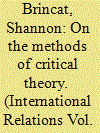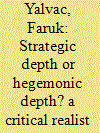| Srl | Item |
| 1 |
ID:
113816


|
|
|
|
|
| Publication |
2012.
|
| Summary/Abstract |
The idea of creating an international police force (IPF) was first mooted by Lord David Davies in the 1930s. In 1963 U Thant, Secretary General of the United Nations, then claimed that he had 'no doubt that the world should eventually have an international police force'. Yet our international system has been and continues to be based on states, their sovereignty and a correlative 'inside/outside' distinction: a distinction which is resistant to this idea of some form of systematic international policing writ large. Instead of the establishment of an IPF, a new form of international policing has emerged through the unprecedented use of police abroad and the potential consolidation of more specific operational policing norms. This is a phenomenon that may not be as permanent nor as wide ranging as earlier conceptualisations that concerned themselves with a more structured management of interstate behaviour, but, nonetheless, it increases the possibilities for achieving an international order based on the rule of law.
|
|
|
|
|
|
|
|
|
|
|
|
|
|
|
|
| 2 |
ID:
113818


|
|
|
|
|
| Publication |
2012.
|
| Summary/Abstract |
This article offers a reconstruction of the methodological tools pioneered by the first generation of the Frankfurt School (FS) and how they have been adapted in the contemporary project of emancipation in Critical International Relations Theory (CIRT). It is argued that the praxeological and methodological commitments of the early FS are of continuing utility in the post-positivist turn in IR theory. The paper also argues that CIRT has made significant advances on the original programme of CT developed by Horkheimer in the early 1930s. In particular, it is contended that the alleged pessimism typically associated with the later work of the early FS can be overcome if critical analysis looks beyond the state to those possibilities of emancipation pregnant within the global processes of world politics. Here the work of CIRT is argued to offer a number of advances on the sociology of the early FS, which was problematically confined to the examination of Euro- and state-centric possibilities for emancipation.
|
|
|
|
|
|
|
|
|
|
|
|
|
|
|
|
| 3 |
ID:
113814


|
|
|
|
|
| Publication |
2012.
|
| Summary/Abstract |
This paper tests the explanatory power of the main strands of neoclassical realism in accounting for US foreign policy after the Cold War. According to the emphasis they place on the relevance of structural versus non-structural variables in foreign policy making, three schools can be identified. The first school restricts the role of non-structural factors to accounting for anomalous behavior; the second school argues that non-structural variables should also be included in order to understand the policy's timing and style, and, in times of security plenty, its content; while the third school contends that it is international structural factors, i.e. a state's strategic interactions with other polities, that shape most foreign policy. Following the test of their forecasts versus the historical record, the third school emerges as providing the most accurate account and as the most promising avenue of research for neoclassical realism.
|
|
|
|
|
|
|
|
|
|
|
|
|
|
|
|
| 4 |
ID:
113815


|
|
|
|
|
| Publication |
2012.
|
| Summary/Abstract |
This paper is an attempt to provide a critical realist analysis of the concept of 'strategic depth' recently being used in analysing Turkish foreign policy. The article provides a criticism of the realist geopolitical thinking on which the concept of strategic depth is based using the insights of the critical realist philosophy of science. It takes the concept of ontological depth from critical realism and extends it to Gramsci's analysis and develops the concept of hegemonic depth. Underlying the concept of hegemonic depth is the idea that geopolitical relations should be thought of in connection with the social structures that give rise to them. The article is intended as a contribution to a historical materialist analysis of Turkish foreign policy where a state-centric positivism dominates, as well as an attempt to develop a social theory of foreign policy based on critical realism.
|
|
|
|
|
|
|
|
|
|
|
|
|
|
|
|
| 5 |
ID:
113817


|
|
|
|
|
| Publication |
2012.
|
| Summary/Abstract |
This paper uses Patrick Thaddeus Jackson's monism/dualism distinction to clarify ongoing methodological debates among students of critical terrorism studies (CTS). We map the distinction onto the CTS literature and emphasize the distinctive ontological starting points and the distinctive epistemological frameworks entailed by each perspective. Then we critically engage monistic, or interpretivist, CTS research, especially that of Richard Jackson. We argue for a more methodologically explicit and logically consistent interpretivist CTS and we suggest three important steps that researchers can take to achieve this aim: (i) take an explicit ontological stance; (ii) embrace reflexivity; (iii) conceptualize terrorism as a meaning-making practice.
|
|
|
|
|
|
|
|
|
|
|
|
|
|
|
|
| 6 |
ID:
113813


|
|
|
|
|
| Publication |
2012.
|
| Summary/Abstract |
The world has now experienced what could be regarded as 20 years of Institutional Liberalism: the dominance of the view that cooperation in world politics can be enhanced through the construction and support of multilateral institutions based on liberal principles. E. H. Carr was famously skeptical of liberalism as he understood that tradition. This essay, prepared originally as the E. H. Carr Lecture at Aberystwyth University, interrogates Institutional Liberalism through a lens provided by Carr's most famous book on international relations, The Twenty Years' Crisis. It points out three trends since the 1990s that may be associated with Institutional Liberalism: increasing legalization; trends toward more legalism and moralism; and a decline in the coherence of some international regimes. Reviewing these trends in light of Realist critiques of liberalism, the essay rejects Realism as a good moral or practical guide to world politics, but reaffirms the value of the Realist view that institutions depend on structures of power and interests. Increases in legalization, legalism and moralism reflect a fusion of the social purpose of liberal democracies with their unprecedented geopolitical power since 1991. But declines in the coherence of international regimes reflect a greater divergence of interests, weighted by power. All international institutions are flawed and in some ways precarious, but strengthening them in ways that reflect legitimate social purposes remains a major challenge for our time.
|
|
|
|
|
|
|
|
|
|
|
|
|
|
|
|